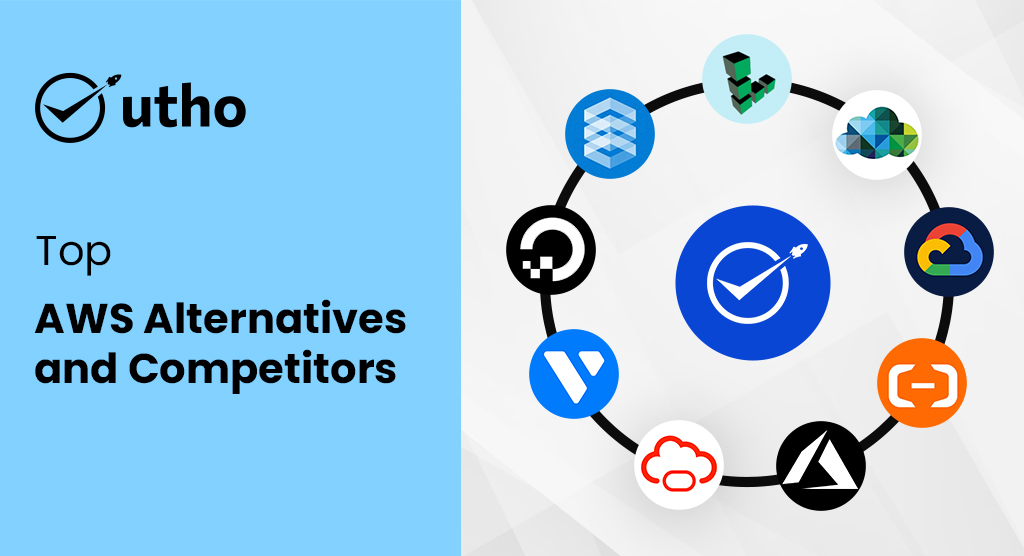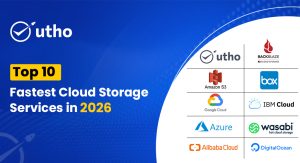While AWS remains the largest cloud provider, offering over 240 cloud products including cloud, on-premise, serverless, and edge computing services, bigger doesn’t always mean better. Join us as we explore the top 10 AWS alternatives in 2026 and discover why size isn’t everything in the world of cloud services.
How to Select Top Cloud Service Provider for Your Business
Before diving in, consider these factors before investing time, money, and effort in any of the AWS options listed here:
Total Cost of Ownership
Some cloud providers are more cost-effective depending on your workload. For example, Oracle Cloud Infrastructure can be up to 50% cheaper than AWS for Oracle workloads and applications.
Supported Services
Most cloud providers offer similar services, but unique services can make a big difference. For example, Vultr offers fast servers. They also offer VPS with easy setup and good prices.
Reliability
Choose a cloud provider with a strong uptime record and ideally a 99.95% (or higher) guarantee.
Cloud Security
Data breaches can be expensive, with an average cost exceeding .5 million, according to trusted sources. Look for vendors that offer strong security features such as data encryption, DDoS protection, and comprehensive identity and access management (IAM).
Technical Support
Reliable support is essential. Smaller providers like Linode and Vultr often offer responsive 24/7 support without a premium contract.
Compliance
If you have to comply with any regulations (e.g. GDPR, ISO), make sure your cloud provider adheres to these standards.
Scalability
Your provider must support automatic scaling. It must scale up or down and in or out to meet changing workloads. diagonal scalability.
Performance
For operations like live game servers or streaming services, your provider should offer low latency. They should also offer high performance. They must handle them well.
Location of the server center
A nearby data center can reduce latency issues. Multiple locations can help with recovery and data backup. They do this by reducing single points of failure.
Vendor lock-in
Choose a platform with open source if you want to integrate many solutions. Or if you want to use a multi-cloud environment. This ensures that you can easily move your data and apps to another provider if needed. Now let’s explore the best AWS options to consider.
Reasons to look for AWS alternatives
If you were an early adopter of the cloud, you probably chose AWS because the options were limited at the time. You might leave AWS for a niche provider’s specialized services or have other reasons.
Here are some of the top reasons why customers switch to AWS competitors.
Having too many options can be daunting
We just looked it up. AWS offers over 240 full cloud services in many categories. They offer many services for the same purposes. They also have a wide range of units and pricing options. This makes AWS a great choice if you need multiple services from a single provider. But the abundance of options can sometimes be overwhelming to navigate.
Hidden Costs and Surprises
According to reliable sources, 95% of AWS customers found it difficult to understand their AWS bills. This difficulty in understanding costs has consistently been the number one reason customers decide to leave AWS. Thus, the main challenge for AWS users remains to understand, manage and optimize their cloud spending.
Lack of Responsive Customer Service
This is somewhat expected. The larger the platform, the less support there is to meet the needs of individual customers. However, AWS offers premium support plans. These range from developer (technical) to enterprise (ongoing business).
Transitioning Away from AWS
Despite the fact that AWS offers almost unlimited cloud computing options, there may come a time when you need to move elsewhere. For example, Dropbox decided to move away from AWS. They did this and built their own custom tech to effectively manage costs and compliance.
EC2 Limits
AWS limits resources by region, with a default limit of 20 instances per region.
These limitations have led to the rise of many other platforms. There are several good paid and open source AWS options available today. When deciding on a cloud service provider, take these factors into account:
- Availability, security and reliability
- Cost and budget
- Customer support availability in the desired region.
- Compliance Migration support, vendor lock-in and exit planning
Top 10 AWS Alternatives in 2026
We have carefully selected for their features and specifications. When choosing between these options, compare your needs with each platform’s features. This will help you choose the platform that best suits your needs and offers the highest quality services. Below are the list of the top 10 AWS alternatives.
| DigitalOcean |
| Kamatera |
| Vultr |
| Utho |
| Linode |
| VMWare Cloud |
| Google Cloud Platform |
| Alibaba Cloud |
| Microsoft Azure |
| Oracle Cloud |
Taking all aspects into account, here are some of the top contenders as AWS alternatives that can be explored.
DigitalOcean
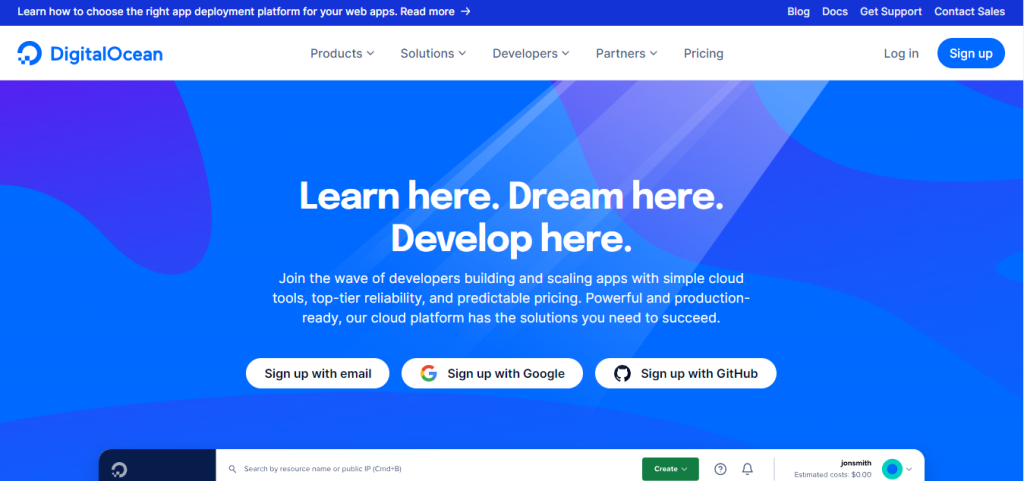
DigitalOcean offers a simplified cloud infrastructure platform ideal for developers and small and medium-sized businesses. It has a simpler API, UI, and CLI than AWS. This makes it a favorite among developers. They prefer fast SSD-based VMs and Cloudways cloud hosting.
DigitalOcean offers both managed and self-managed cloud VPS services. They enable managed Kubernetes with a 99.5% SLA. It’s a developer-friendly cloud provider. It stands out for its great documentation and support. It offers scalable machines and plenty of network bandwidth for intensive workloads.
DigitalOcean has 15 data centers in eight regions around the world.
Kamatera
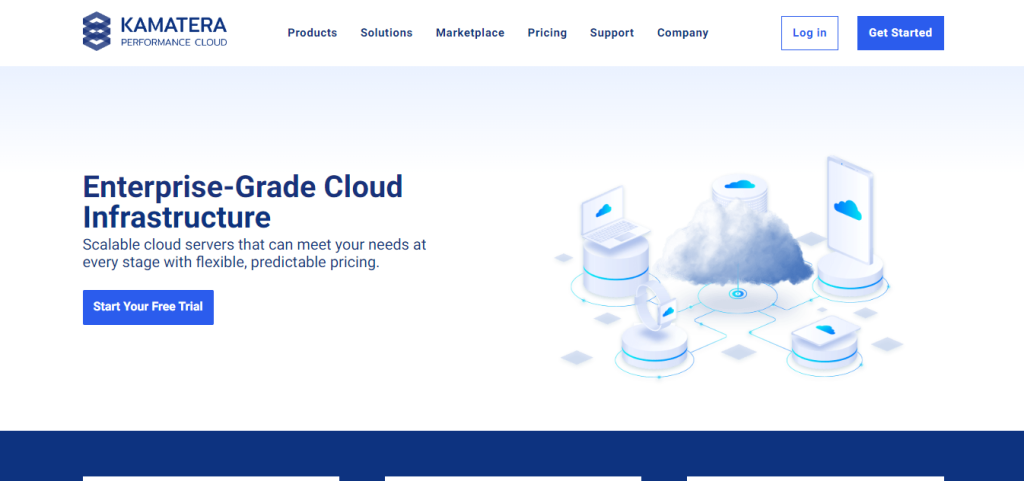
Kamatera offers both managed and unmanaged cloud services, including web hosting, suitable for a variety of high-performance use cases.
Kamatera supports capturing over 100 operating systems, both Windows and Linux. You can also add load balancers. You can add private networks, firewalls, and virtual desktops.
One drawback is the limited global coverage. There are 18 data centers in four regions. This can affect tiered data backup and disaster recovery. However, Kamatera offers a 99.95% uptime guarantee.
The platform has a user-friendly control panel. It also has fast customer support and enterprise cloud infrastructure. Like AWS, Kamatera requires a premium for broader support.
Kamatera is powerful, secure, and low-cost. It is a AWS alternative for all sizes of organizations.
Vultr
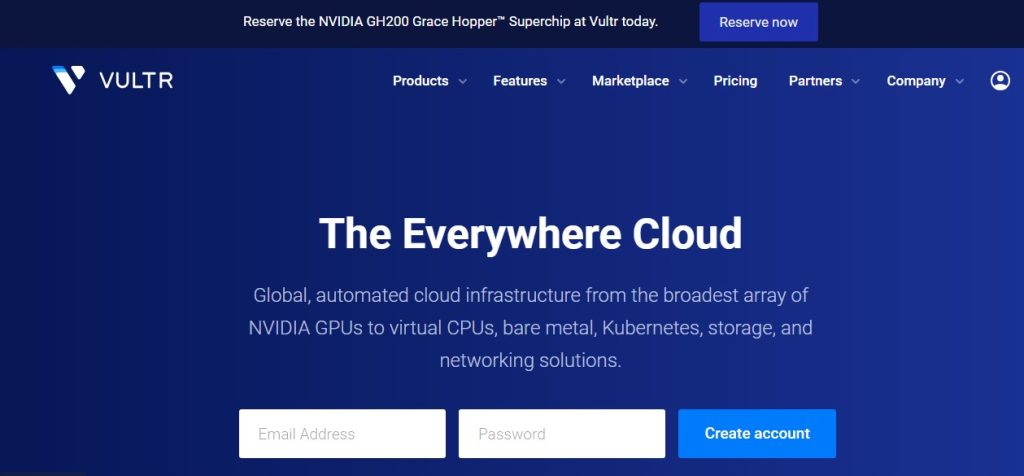
Vultr offers a robust VPS and web hosting platform tailored for small and medium-sized businesses. Like Kamatera, it offers quick setup (up to 60 seconds with one-click deployment) and simplified management.
However, Vultr stands out with more data centers (32 compared to Kamatera’s 18) and more than 3.0 GHz servers. It uses 100% SSD VPS servers with 100% Intel vCPUs and storage.
The KVM-based platform lets you download your operating system (ISO). This includes Linux (Debian, Fedora, CentOS, Arch Linux, Rocky Linux), Windows, and FreeBSD. Vultr also provides root access. This allows you to deploy modern open-source databases like MongoDB and Redis. You can also deploy web servers like Nginx, Apache, and OpenLiteSpeed.
Also read: Top 10 Vultr Alternatives in 2026: A Detailed Comparison
For security, Vultr includes DDoS protection. It has 10 Gbps capacity per instance to handle the increased load.
Vultr also offers more self-help resources than Kamatera. They respond to emails in minutes. They give detailed answers. And, they do it all for free. AWS and Kamatera charge extra for this.
Vultr is a powerful, flexible, and secure option. It is for businesses that need a strong cloud platform.
Utho
Utho Cloud distinguishes itself with its intuitive user interface (UI), flexible API, and command-line interface (CLI) options, making cloud management effortless. Offering competitive pricing models with greater transparency compared to AWS.
Utho ensures cost-effectiveness (helps businesses to reduce cloud cost by 60% as compared to AWS) without compromising quality or performance. Its extensive product lineup encompasses virtual machines, managed Kubernetes, databases, storage solutions, serverless computing, and more, catering to diverse business requirements.
With robust support options and comprehensive documentation. Utho provides reliable assistance and guidance to its users.
Tailored specifically for growing businesses, Utho Cloud empowers organizations to scale and thrive in the cloud ecosystem with confidence and ease.
Linode
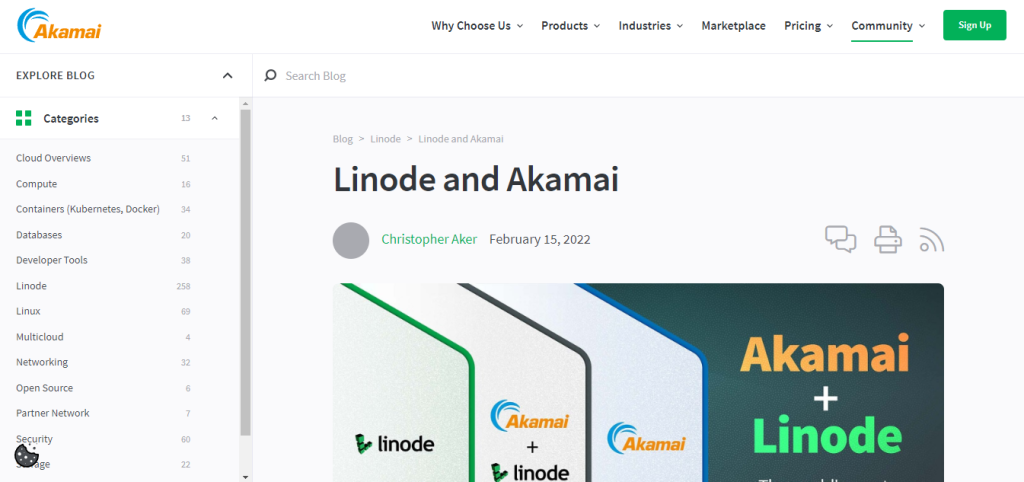
Now part of Akamai’s Connected Cloud. Linode is great at cloud security and content delivery. It is known for its powerful NVMe-based block storage, built-in security features such as DDoS protection and cloud firewall, and 99.99% SLA.
For Linux servers and VM users, Linode is perfect. It covers more than 130 countries and 4,100 locations, making it one of the most widespread cloud platforms available.
It has been the largest open cloud service provider for over 10 years. Linode integrates well with other platforms. Its Amazon S3-compatible object storage reduces the risk of vendor lock-in. Linode also offers an easier-to-use dashboard, APIs, and security solutions compared to AWS.
Linode offers lots of support. They have developer videos, tutorials, and technical documentation. They beat competitors like Kamatera. It offers managed services. It also has one-click app installations and 24/7 customer support. The support is more responsive than AWS’s.
Linode’s pricing is simple and offers great value for most uses. It has flexible billing options (daily or monthly, pay in installments) to avoid surprises.
Linode is powerful, secure, and user-friendly. It’s ideal for developers and businesses. They seek reliable performance and support.
VMWare Cloud
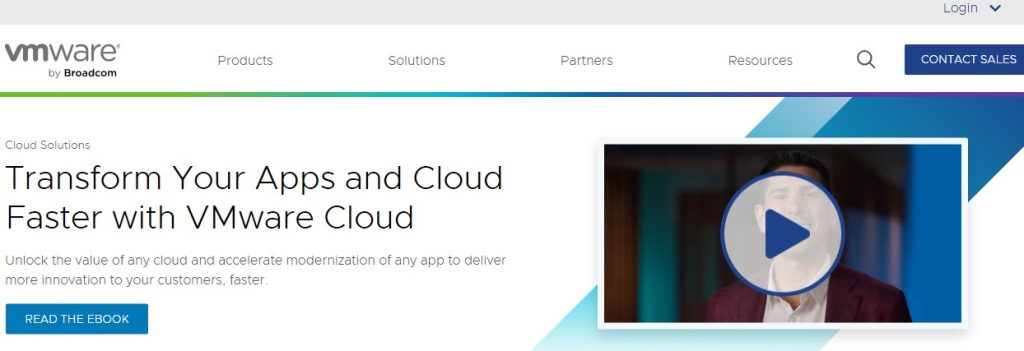
VMware, now owned by Broadcom, is famous for its on-premises virtualization solutions. However, VMware Cloud also supports hybrid and multi-cloud setups. It’s a great choice if you want to use public and private cloud providers. You’d use them with your on-premises infrastructure.
Using VMware Cloud on AWS allows you to connect hybrid and multi-cloud environments to your AWS configuration. This method is different from running workloads directly on AWS. For example, VMware Cloud on AWS offers better compatibility. It has a unified way of operating between public and private clouds. And, no need to change applications when moving to AWS.
VMware also provides tools to make and run native applications with Tanzu. It manages the cloud with CloudHealth and protects cloud apps with the NSX firewall. Pricing and support are similar to AWS, but simpler and more responsive. Cloudways, Dell Technologies Cloud, and HPE Hybrid Cloud Solutions offer capabilities. These are similar to VMware Cloud.
Google Cloud Platform
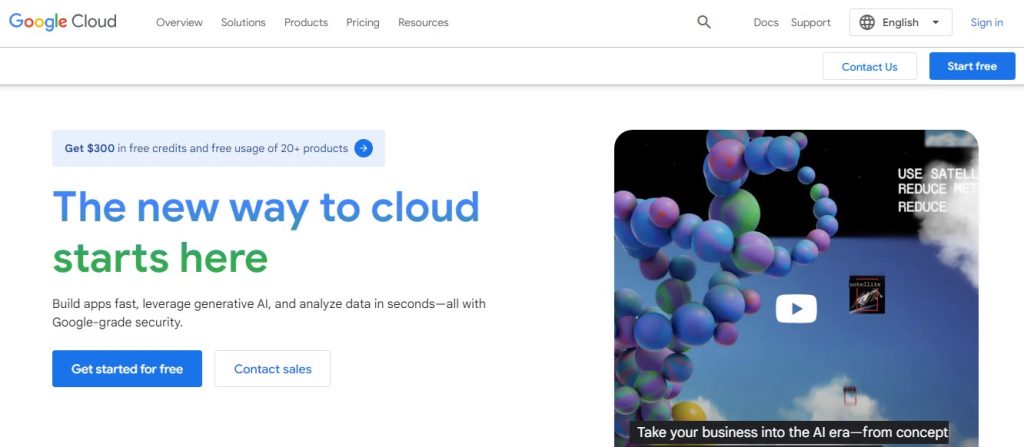
If you want an all-in-one cloud provider, Google Cloud Platform (GCP) is a strong choice. It is the third largest provider worldwide, according to Synergy Research Group.
GCP offers a full range of services, including IaaS, PaaS, and SaaS. AWS offers more cloud services, data centers, and pricing options. But, GCP excels in several areas.
For example, Google made Kubernetes. They gave it to the Cloud Native Computing Foundation (CNCF). Now, they sell a managed version as Google Kubernetes Engine (GKE). Many developers think GKE is stronger than ECS and EKS. They consider it more robust than AWS.
Google is very good at machine learning, AI, and web search. This is useful for organizations that want advanced cloud analytics and business intelligence.
However, managing GCP billing, customer support, and many options can require a learning curve. It also requires experience.
Alibaba Cloud
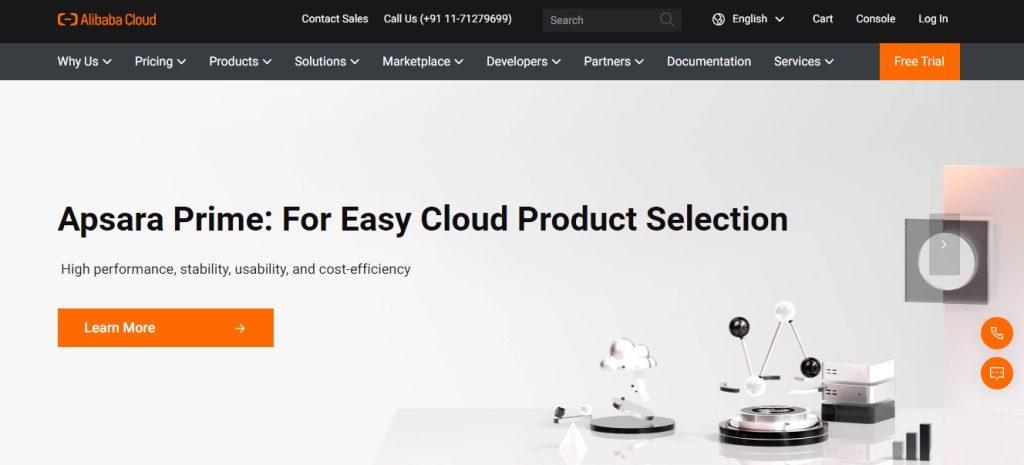
Alibaba Cloud is the biggest competitor of AWS, Azure, GCP, and it offers more than 100 cloud products. This cloud-based provider supports public, private, and hybrid clouds. It also supports multi-cloud arrangements, like US providers.
It has data centers on six continents. It has 22 regions, 63 availability zones, and over 70 locations. They’re found worldwide. Alibaba Cloud is great for businesses of all types and sizes.
Like AWS, Alibaba Cloud has a strong e-commerce background on Alibaba.com. So, it’s a solid AWS alternative, if you want something similar but less complex.
Alibaba Cloud provides many managed services. These include elastic load balancing, object storage, databases, and it’s website hosting.
You’ll gain from its powerful AI and data analytics solutions, too. Also, Alibaba Cloud has low prices. This makes it attractive to businesses. They want high-quality cloud services on a budget.
Microsoft Azure
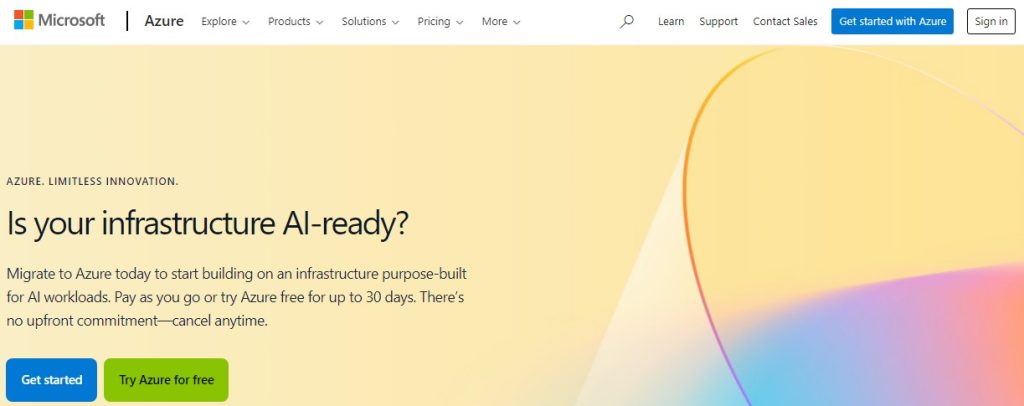
Microsoft’s Azure Cloud offers cloud services. They’re very like Amazon Web Services (AWS). They include computing, storage, networking, and web hosting.
Azure has the world’s second-largest network of data centers. It beats AWS in some areas, like edge computing and content delivery networks (CDN).
Also read: Discover the Top 10 Azure Alternatives for 2024
In the enterprise cloud services segment, Azure is almost on par with AWS. One reason is the significantly lower cost of Windows licenses on Azure compared to AWS. This knowledge makes it easier to deploy Azure virtual desktops and cloud services. You can use existing licenses and tools with less training and an easier learning curve.
Azure also excels as a hybrid and multi-cloud provider. It offers a robust Platform as a Service (PaaS) with many deployable building blocks. These are for AI, machine learning, analytics, and serverless workloads.
Oracle Cloud: A Strong AWS Rival for Databases and Custom Apps

Oracle Cloud Infrastructure (OCI) combines the strengths of AWS and Azure with its own unique features.
OCI also emphasizes PaaS, custom apps, and high-performance computing for enterprises. Like Azure, it focuses on these things. Oracle’s “Bring Your Own Licenses” program cuts the cost of Oracle applications in half. It also cuts the workload in half. Azure handles Windows licenses. OCI is highly scalable, secure and offers multiple pricing like AWS.
OCI excels in its scalability for enterprise workloads. For example, Amazon RDS for Oracle limits database sizes to 128 vCPUs (64 OCPUs) and 64 TB. In contrast, OCI Exadata Database Service supports up to 8060 vCPUs and 3.1 PB.
You can move your on-premise workloads to OCI without any changes. You can still use the same services, billing models, and SLAs as in the public cloud. AWS Outposts does not currently offer this feature.
OCI is ideal for customer service apps like CRMs with Salesforce.
Join Utho, the Alternative to AWS for Growing Businesses
Utho is dedicated to meeting the requirements of SMBs, startups, and developers by offering an intuitive interface and a wide array of products, including virtual machines, managed databases, managed Kubernetes, storage, and more. Plus, Utho is committed to reducing cloud costs by up to 60% and providing more affordable cloud services as compared to AWS.
Sign up today and see if Utho is right for you.
Also read:

